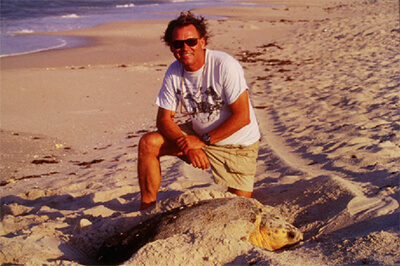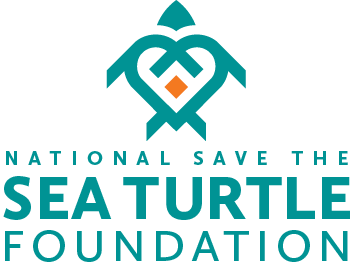A Tribute to Doc In memory of Llewellyn Ehrhart (April 22, 1942- March 3, 2022)
Karen Holloway-Adkins
An ocean of memories, laughter, and tears flood in with the passing of our dear colleague, mentor, and trusted friend, Professor Llewellyn McDowell Ehrhart. Some called him Llew, but most of us called him “Doc”. At one of our frequent informal gatherings, Carol, Doc’s wife and lifelong friend, told us that “Doc” was a childhood nickname, but the professors at Cornell University were not impressed with an underling being called “Doc”. We all laughed knowing Doc was likely already ahead in the academic game! He graduated December 1971 with a PhD from “some little old school in Ithaca, New York”, as he modestly referred to Cornell University. It was during his time at Cornell that he was a graduate student of Associate Professor of Zoology, James Layne (1926-2017), studying small mammals with a focus on subspecies of Peromyscus polionotus (oldfield mice). His study of three subspecies of oldfield mice often brought him to Florida and eventually led to an opportunity for a teaching position at Florida Technology University (now University of Central Florida) in Orlando.

Professor Emeritus Llewellyn “Doc” Ehrhart with a loggerhead
turtle in 1999. (Photo by William Redfoot)
turtle in 1999. (Photo by William Redfoot)
In early 1970, Doc received funding from NASA to catalog the vertebrate community at Kennedy Space Center (KSC). Using his knowledge of habitat types and skills at capturing vertebrates, he and his students logged the amphibian, reptile, and mammal communities present on the properties now known as Canaveral Space Force Station, Merritt Island National Wildlife Refuge, and Canaveral National Seashore. During this time, Doc took interest in the sea turtles nesting on the beaches north of KSC and began a monitoring program. He and his students measured, tagged, and even weighed (!) the large nesting female turtles that came ashore to lay their eggs. Also, during this time he spoke with generational fisherman about a collapsed sea turtle fishery in the adjacent Mosquito Lagoon and undertook a sea turtle netting program in the lagoon. This early work fueled what would become a lifelong passion and undertaking to better understand the life history and ecology of marine turtles in Florida. Winter cold-stun events periodically occurred in this northern end of the Indian River Lagoon Complex. The sea turtles, especially green turtles, would become comatose-like and strand along the southern shoreline of Mosquito Lagoon, pushed there by north winds or they would bob like coconuts at the water’s surface. Researchers and conservationists worked quickly to protect the surviving turtles from scavengers until temperatures warmed. It was during this time that many saw fibropapillomatosis (FP) firsthand, a potentially debilitating disease that manifests as tumors on the eyes and soft tissue of primarily green turtles. FP was starting to take hold among sea turtle populations that resided in lagoon waters of Florida and when Doc began netting in the lagoon south of Sebastian Inlet, FP was already present in the turtle population. He shared the concern with other researchers of the implications of FP among green turtle aggregations. He worked with researchers at University of Florida and many of his students went on to study the etiology of FP, its associated viruses, suspected environmental co-factors, the transmission and responsible vectors, and effects of FP on marine turtle populations.
All the while, Doc was teaching at the University. If you ever were fortunate enough to take a course with Dr. Ehrhart, it was memorable. He brought enthusiasm and energy to the classroom like no other professor most students encountered. Whether it was an undergraduate course in Vertebrate Zoology or graduate courses in Herpetology and Mammalogy – Doc was vibrant, informative, and you learned skills - real life career skills. You became, what I like to term, a forensic biologist. You didn’t just learn how to capture and handle an animal. You learned their life history; what habitat type a species occupied, tell-tale signs of their presence - the tracks and dens they made, the animals they shared refuge with, what natural predators and other threats existed, and more. And Doc always had a mesmerizing story or fact that made learning in class and in the field memorable. Those of us fortunate enough to share this space with Doc, could spend hours reminiscing the tales of Doc and Doc’s tales. We knew his favored animals and we laughed that he would never call something like his much-revered southeastern beach mouse as “cute”, but he would say “that is one handsome animal!” He couldn’t resist the opportunity to handle a Diamondback rattlesnake or tell you in animated elaboration – the remarkable evolution of dentition that led to the snake fang. He reveled in the opportunity to share many of his stories, and we spent many an evening waiting for a female sea turtle to complete her nesting ritual while enjoying Doc’s stories.
Doc not only shared his love of sea turtles and other vertebrates, but we were also lucky in that he shared his life with us. Our hearts broke with him when he lost his dear wife Carol, who would sometimes accompany us to the beach late at night to catch a glimpse of a nesting turtle or cook us a spaghetti dinner on a particularly long day on the water catching sea turtles. Doc shined when he talked about his twin daughters, Mandy and Ashley – the Double Trouble tennis duo and their major academic and life accomplishments, and the way they looked after him after their mom’s passing. We always felt like we were part of that great family, and we are so grateful for them for sharing Doc.
Doc authored and co-authored numerous key scientific publications over his lifetime. He served as the Team Leader of the Southeastern Region Loggerhead and Green Turtle Recovery Team. He received several awards including the International Sea Turtle Society’s Lifetime Achievement, Sea Turtle Conservancy’s Archie Carr Lifetime Achievement, Carnegie Professor of the Year for Florida, UCF Pegasus Professor, Inaugural UCF Arboretum’s Earth Day Conservation Hero, Preserve Brevard’s Charlie Corbeil Conservation, U.S. Fish & Wildlife Service Regional Director’s Honor Award for Conservation Partners and, most recently, Paul Moler Herpetological Conservation award. Doc would likely say his greatest honor was to have contributed to the formation of the Archie Carr National Wildlife Refuge, the most significant loggerhead nesting habitat in the Western Hemisphere. The three decades of data collected on nesting sea turtles along the shores of south Brevard and Indian River counties was instrumental in convincing Congress to recognize and assist in land purchase to form the Refuge. It’s befitting that Doc’s birthday is Earth Day (April 22nd). He certainly reverberates the passion I would hope we would all feel for the earth. Saying goodbye to our dear friend has been difficult but his compassion for sea turtles lives on in so many of us and he would have really liked that. And I think he would have said that his job was done here.
In a talk given at the Friends of the Carr Refuge meeting, Doc spoke about the students that came through his courses and UCF Marine Turtle Project. He remarked “.... and we have been really blessed with highly-motivated, really capable students down through the years and that will probably be my legacy, if there is such a thing.” Thank you, Doc – your legacy certainly lives on in all of us.
Helping Sea Turtles Survive for 39 Years
A NON-PROFIT ORGANIZATION
State of Florida Registration Number CH-2841 | Internal Revenue Code 501 (c) (3)
Web Design & Development by Web Expressions, LLC

